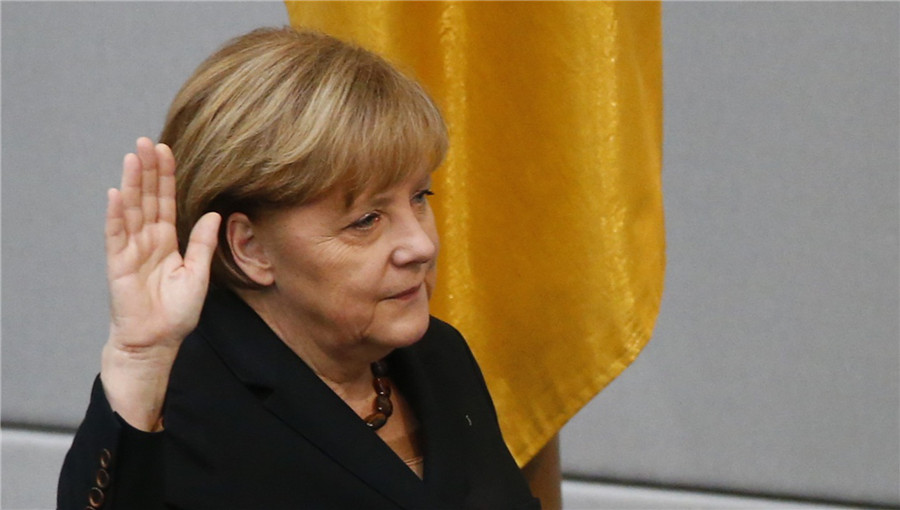BERLIN -- German Chancellor Angela Merkel was sworn in for a third term after being reelected in a vote in the lower house of parliament on Tuesday.
Her coalition government will rule Europe's biggest economy for the next four years.
 |
|
German Chancellor Angela Merkel is sworn-in by Parliament President Norbert Lammert (not pictured) during the meeting of Germany's lower house of parliament, Bundestag in Berlin December 17, 2013. [Photo/Agencies] |
The chancellor won the parliament election with 462 votes in favor, with 150 voting against and nine abstentions. Merkel was formally appointed by German President Joachim Gauck at the president's official residence and headed back to the parliament to be sworn into office, thus becoming the country's third post-war chancellor to win a third term.
Merkel will address the parliament on Wednesday and then travel to Paris to meet President Francois Hollande in her first foreign visit of the new term.
Cabinet ministers of the new coalition government, formed by Merkel's Christian Democratic Union (CDU), its Bavarian sister party Christian Social Union (CSU), and the Social Democrats (SPD), were also formally appointed and took the oath in the parliament.
Prominent members of the new cabinet include Ursula von der Leyen, the country's first female defence minister, and finance minister Wolfgang Schaeuble, who joined hands with the chancellor in Germany's efforts to fight the eurozone debt crisis.
SPD party leader Sigmar Gabriel became minister of a new Economy and Energy Ministry and take responsibility for Germany's ambitious plan of energy transformation from nuclear power to green energy. SPD veteran Frank-Walter Steinmeier is back as the foreign minister. He has served in that post from 2005-2009 under Merkel.
The new cabinet put an end to more than two months of political limbo after the September 22 elections when Merkel's bloc, the biggest winner with 41.5 percent of votes, fell short of an absolute majority. The SPD took 25.7 percent of the votes.
The grand coalition between Merkel's conservatives and the SPD, as in Merkel's 2005-2009 first term, is supported by most Germans, as a poll for public broadcaster ZDF published Friday showed that 49 percent of Germans welcome a grand coalition while 33 percent opposed it.
However, the coalition government was only able to become a reality last week as a majority of the SPD members backed the proposed coalition deal in a binding vote within the party. Some SPD members harbor skepticism on becoming Merkel's junior partner again. The party suffered a electoral defeat in 2009 after serving as Merkel's junior coalition party in her first term.
HARD-WON RESULTS
SPD chief Sigmar Gabriel has worked hard to convince his party members to support the left-right government as he won key concessions from Merkel's camp on SPD's core concerns and centerpiece policies during the coalition talks.
During the coalition talks, the SPD insisted on the introduction of a national minimum wage of 8.50 euros ($11.41) per hour, which was a key election platform. Although Merkel has repeatedly reiterated her opposition to the national minimum wage on concerns that it would destroy jobs, she finally gave in.
The national statutory minimum wage is scheduled to be introduced in Germany from January 2015. Merkel said earlier that she would try to prevent job losses that may be caused by the move.
Among other agreed policies proposed by the SPD, dual citizenship will be allowed for children who grew up in Germany and were born after 1990 to foreign parents. Currently they have to choose between German citizenship and that of their parents when they reach 23 years of age.
|
|
|
|
|
|
|
|